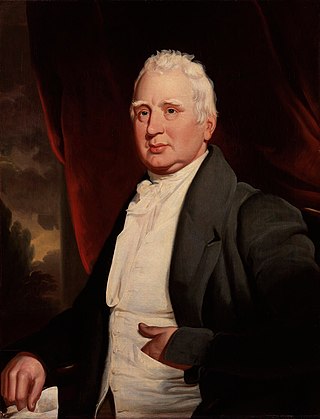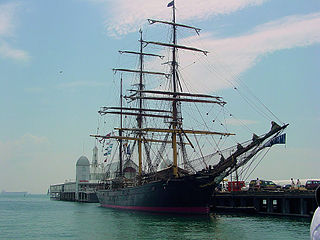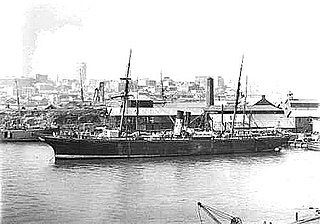Related Research Articles

William Cobbett was an English radical pamphleteer, journalist, politician, and farmer born in Farnham, Surrey. He was one of an agrarian faction seeking to reform Parliament, abolish "rotten boroughs", restrain foreign activity, and raise wages, with the goal of easing poverty among farm labourers and small land holders. Cobbett backed lower taxes, saving, reversing commons enclosures and returning to the gold standard. He opposed borough-mongers, sinecurists, bureaucratic "tax-eaters" and stockbrokers. His radicalism furthered the Reform Act 1832 and gained him one of two newly created seats in Parliament for the borough of Oldham. His polemics range from political reform to religion, including Catholic emancipation. His best known book is Rural Rides. He argued against Malthusianism, saying economic betterment could support global population growth.

James Craig is a three-masted, iron-hulled barque restored and sailed by the Sydney Heritage Fleet, Sydney, Australia.

William Conyngham Plunket, 1st Baron Plunket, PC (Ire), QC was an Irish politician and lawyer. After gaining public notoriety as the prosecutor in the treason trial of Robert Emmet in 1803, he rose rapidly in government service. He become Lord Chancellor of Ireland in 1830 and served, with a brief interruption, in that post until his retirement in 1841.

Sydney Heritage Fleet, is the trading name of Sydney Maritime Museum Ltd., a public company in Sydney, New South Wales, Australia.
Horse Latitudes is tenth collection of poetry from the Northern Irish poet Paul Muldoon. It was published by Faber and Faber on 19 October 2006. It consists of 19 sonnets, each named for a battle beginning with the letter B.
SS Clan Macneil was a UK steam cargo liner. She was launched in 1921, survived the Second World War and scrapped in 1952. She spent her entire career with Clan Line.

City of Adelaide was an iron-hulled ship that was launched in Scotland in 1863, spent a long career in Australian passenger and cargo service, and sank off the coast of Queensland in 1916. She served with several Australian shipowners, including the Australasian Steam Navigation Company, Australasian United Steam Navigation Company and Howard Smith Company.

The Waterford Steamship Company provided shipping services between Waterford and Bristol and Liverpool from 1836 to 1912.

Amazon is a 102-foot (31 m) long screw schooner and former steam yacht built in 1885 at the private Arrow Yard of Tankerville Chamberlayne in Southampton.

The Herald was an iron paddle steamer imported as frames from the United Kingdom and assembled in 1855 by Richard Johnson in Sydney Harbour, New South Wales, Australia, where she was registered. The Herald is one of the earliest iron paddle wheel steamers built in Australia, where she operated within Sydney Harbour. She was initially used on the fledgling North Shore route between Dawes Point and Blues Point by the newly formed North Shore Steam Company; however, due to not enough traffic to make her financially viable, she often performed tug duties. Eventually the North Shore Steam Company was wound up; the vessel was put up for sale but continued picking up business wherever it was available, operating as a tug, ferry, excursion boat and cargo vessel.
Asia was a 410-ton merchant brig built at Shields in 1817. During her career she made one voyage for the British East India Company (EIC), and one transporting convicts from England to Van Diemen's Land. She is last listed in 1833 and may have wrecked late that year.
Loch Bredan was a British sailing ship built in Glasgow in 1882 which disappeared without trace with all hands around November 1903.

Sir John Richardson (1771–1841) was an English lawyer and judge.
Hooghly was a full-rigged merchant ship built on the Thames, England, and launched in 1819. She made two voyages under charter to the British East India Company (EIC), four voyages transporting convicts from England and Ireland to Australia, as well as voyages transporting emigrants to South Australia between 1839 and 1856. Around 1858 she was re-rigged as a barque. She sank off Algiers in 1863.
Marchioness Wellesley was a packet paddle steamer launched in 1826 for the Dublin and Wexford Steam Co. She may have been the first steamship built in Ireland. She operated out of Dublin and was last listed in 1838.
Robert (Bob) Johnson (1745–1833) was an Irish barrister, politician and judge. He sat in the Irish House of Commons and was a judge of the Court of Common Pleas (Ireland).
Juverna was a schooner launched at Portaferry in 1804. She immediately became a slave ship in the triangular trade in enslaved people. She made one complete slave voyage. A French squadron captured her in late 1805 or early 1806 before she could embark any slaves on her second slave voyage.
References
- ↑ "Definition of Iverna, Juverna, Ierna". Numen, the Latin Lexicon. Retrieved 17 November 2019.
- ↑ Watson, James (1883). Notes on the Early History of Scotland. Vol. I. J. Watson. p. 49.
- ↑ Juverna (1803). Cobbett, William (ed.). "Affairs of Ireland". Cobbett's Weekly Political Register. IV. London. Letter I: no. 16 (22 Oct) cc545–553 Letter II: no. 17 (29 Oct) cc586–587 Letter III: no. 18 (5 Nov) cc609–616
- ↑ Uglow, Jenny (2014). "Always capable of doing mischief". In These Times: Living in Britain through Napoleon's Wars, 1793–1815. Faber & Faber. ISBN 9780571312627 . Retrieved 17 November 2019.; Jenkins, Thomas; Farquharson, George (1806). Report of the Trial at Bar of the Hon. Mr. Justice Johnson, One of the Justices of His Majesty's Court of Common Pleas in Ireland, for a Libel: In the Court of King's-Bench, on Saturday the 23d Day of November, 1805. London: Butterworth. pp. 80, 81, 112. Retrieved 17 November 2019.
- ↑ Richardson, Benjamin Ward (1888). The son of a star : a romance of the second century. Vol. II. London: Longmans, Green. pp. 174-175. Retrieved 17 November 2019.
- ↑ Coldrey, Barry M. (1988). Faith and fatherland: the Christian Brothers and the development of Irish nationalism, 1838-1921. Gill and Macmillan. pp. 201, 243. ISBN 9780717114788.
- ↑ Frehan, Pádraic (2012). Education and Celtic Myth: National Self-Image and Schoolbooks in 20th Century Ireland. Rodopi. p. 83. ISBN 9789401208659 . Retrieved 17 November 2019.
- ↑ "Juverna Press (Dublin)". worldcat. Retrieved 18 November 2019.
- ↑ Hutton, Clare; Walsh, Patrick (2011). The Oxford History of the Irish Book. Vol. V: The Irish Book in English, 1891–2000. OUP Oxford. p. 86. ISBN 9780199249114 . Retrieved 18 November 2019.
- ↑ "Juverna ship citations in the ship database". www.shipindex.org. Retrieved 18 November 2019.
- ↑ Register of Shipping. Society of Merchants, Ship-owners and Underwriters. 1812. No.1223. Retrieved 18 November 2019.; Fenton, James (17 March 2007). "James Fenton discovers human history in the logbooks of empire". The Guardian. Retrieved 18 November 2019.
- ↑ Lloyd's Register of Shipping. Wyman and sons. 1840. No.660. Retrieved 18 November 2019.; Irish, Bill (2001). Shipbuilding in Waterford, 1820-1882: A Historical, Technical and Pictorial Study. Wordwell. p. 55. ISBN 9781869857509.
- ↑ "Varieties; New Steam-ship, Juverna". The Patent Journal, and Inventors' Magazine (50). Barlow and Le Capelain: 854. 8 May 1847. Retrieved 17 November 2019.
- ↑ Doheny, Michael (1867). "Chapter IX". The Felon's track : a narrative of '48 embracing the leading events in the Irish struggle from the year 1843 to the close of 1848. New York: Farrell & Son. pp. 150-151. Retrieved 17 November 2019.
- ↑ Parsons, R. M. (March 1981). "Bristol Steam's 144 Years: Part Two". Sea Breezes: The Ship Lovers' Digest. 55 (423). C. Birchell: 197. ISSN 0036-9977.
- ↑ Crerar, David A. "The Hattons of Wexford". sites.rootsweb.com.
- ↑ "Advertising". Empire. Sydney. 5 August 1859. p. 1. Retrieved 18 November 2019.
For Sale or Charter — the splendid First-class Clipper Barque JUVERNA, 312 tons reglster.
- ↑ "A Mysterious Loss". Sydney Morning Herald. 3 November 1904. p. 6. Retrieved 18 November 2019.